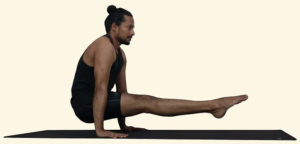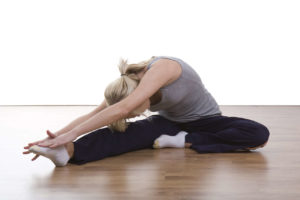Thoughts on stretching while stretching
I used to be limber, in my twenties. In a hurdler stretch I could touch my nose to my knee with my knee straight.
During my twice daily burpee-based calisthenic routine I do a couple stretches—my hamstring for sixty breaths immediately after the burpees and a bridge stretch for nine breaths near the end of the routine.

An L-sit (a bit better than I can do)
I didn’t start stretching to get limber, though. I keep reading that flexibility doesn’t help reduce injury or increase performance. I started with the goal of enabling an L-sit. Lifting against gravity is hard enough. Having to push against my hamstring is too hard to overcome. As an aside, I could hold a L-sit for ten or twenty seconds within the past year. Now I’m trying to do it with sandals acting as weight on my feet.
I also find that stretching your body physically reduces tension physically and mentally, so I find stretching physically calms my life, which I like. I have a feeling most people have found that effect, at least people who stretch.
What I wanted to write about was a pattern I noticed about pain and stretching. When I start a regimen of stretching a ligament, muscle, or whatever we stretch when we stretch consistently, stretching anything beyond the regular range of motion hurts. It’s not just any pain. Stretching a tight hamstring hurts. You can stop it any time you want, so you have to choose to feel it. We all know the feeling.
If I keep stretching consistently for long enough, my range of motion increases. Specifically, I can move farther before it hurts.

My hamstring stretching has gotten far lately. With my knees straight, I can put nearly my whole hand on the sole of my foot, so my toes are around my heels.
What I noticed that I alluded to in this post’s title is that stretching my hamstring doesn’t hurt as much. My range of motion is still limited, but the boundaries aren’t pain. They’re a mix of physical discomfort and painless tension.
Life
Experience in life also brings you tension—emotional tension—that feels painful but that if you challenge yourself enough, it stops being painful and becomes just challenging. I find that learning to overcome these challenges internally develops skills to handle tension and pain including when it feels like it’s coming from outside.
Part of the reason I stretch is to develop these skills to manage emotions so I can apply them elsewhere in life.
Read my weekly newsletter

On initiative, leadership, the environment, and burpees